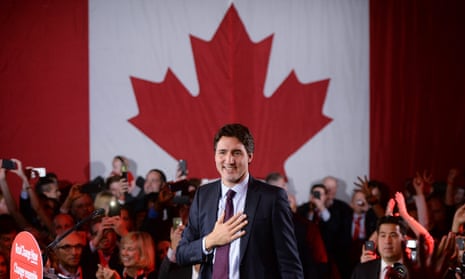Everyone is very excited about Justin Trudeau becoming Canada’s prime minister – particularly foreigners, which should be a sign of something off – and I know why. It was always a foregone conclusion that no one was going to miss Stephen Harper. He was never a leader in any meaningful sense of the word: he had no vision and no inspiring personal qualities.
Canada settled for Harper because, for a long time, there was no one else realistic to settle for. There were, perhaps, more talented and charismatic politicians among the Liberals and the NDP, but those parties were disorganized and unable to win majorities. Canadians are a risk-averse people, so we stuck with the Conservatives and with Harper, who seemed like a calm, boring father. He was nothing special, but he could get the job done.
And Trudeau will certainly be a different kind of prime minister. He might even improve Canadians’ sense of who we can be: he is young and tattooed and bright-eyed, plus into pot and the very latest in hair cuts. There are those boxing photos. He promises a greater boost to our national self-esteem than Harper’s awkward portraits, the best of which saw him clutching kittens with dubious looks on their faces.
More importantly, in matters of substance (and I don’t mean the pot stuff, though that sounds pretty great), Trudeau’s smooth surface is cover for a liberalism that is reassuring to those of us who’ve watched uneasily as the calm, stable Canada we grew up in was dismantled through years of Harperian budget-cutting.
Perhaps the most encouraging outcome of this election is that the Conservatives’ attempt to implement a kind of austerity backfired at last: on Monday night, my fellow Canadians voted to rollback almost 20 years of political penny-pinching.
During my childhood in the era of Brian Mulroney and Jean Chrétien, the word “deficit” was made into an obscenity. The ruling class has, pretty much since Trudeau’s own father was in office, effectively manipulated the Scots Presbyterian cheapness that often grips the heart of middle-class Canadians into a paralyzing fear of debt.
In the process, they punched big holes in the safety net that once made our country into the Canada we like to believe we are: generous and fair-minded. Trudeau’s Liberals just won on a platform that not only promised to reverse austerity but to create three years of deficits.
Still, for all the political relief he may provide and for all that I agree with his stances on a great many issues, I remain uneasy. So do most of my Canadian friends, relieved though they are to see Harper’s back. There is something off about Trudeau: it seems like he shares a certain empty quality, leadership-wise, with Harper.
As a public speaker Trudeau is mostly a campy disaster – a friend described his style as “drama teacher sanctimony” – and as a thinker, well … let’s say he will does not promise to be a match for President Obama in the intellectual curiosity department. Perhaps he is not a bad guy at heart, whatever that means, but it’s hard to tell who his real self is, because Trudeau has burnished himself to the kind of sheen that makes any “honest” moment impossible to trust.
Worse yet, Trudeau traded on his parentage to ascend to where he is today: he sold himself as a leader in large part because of his last name, and Canadians bought in. At the New Yorker, for instance, my fellow Canadian Jeremy Keehn wrote recently that, “Trudeau undoubtedly shares many of his father’s most deeply felt ideals, and his rhetoric has been marked by principled stands that have at times seemed strategically ill-advised.”
Yet the idea that the son is following in the footsteps of the father, and that to do so amounts to living out the courage of a felt conviction is a leap at best and, at worst, merely a projection of what Canadians want the younger Trudeau to be. To put it bluntly: in 2015, in a liberal democracy, it’s a little odd to watch so many people embrace and even celebrate a hereditary approach to government.
The blasé acceptance of inherited leadership bothers me because it is a symbol of everything that always irked me about the culture of my home country. Canadians are often fatalists: they tend to accept their station in life, and that gives the whole country a troubled relationship with ambition.
Politically, our reflexive rejection of ambition means that the governing class is largely a stable set of the same guys and, eventually, their sons. Philosophically, it means that the country has trouble achieving any of its grand dreams of transformation. Canada has a conservative quality that, for a moment when Pierre Trudeau was in office, was narrowly overcome to set up the grand institutions – our Charter of Rights and Freedoms, the Canada Health Act – that briefly made Canada a country that had dreams for itself.
I want for us to get back there. I’m just not sure that Justin Trudeau really has the power – or desire – to take us.
